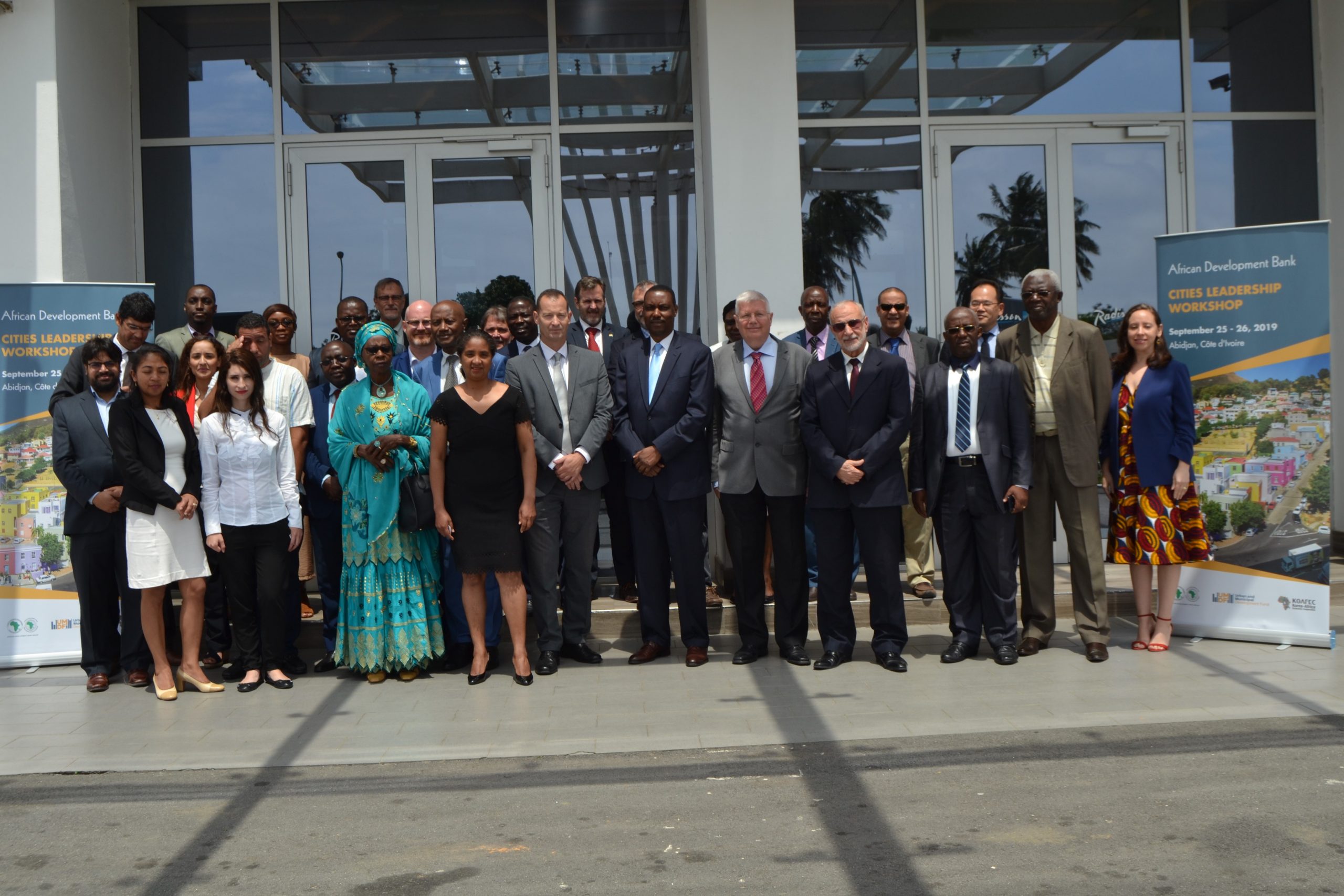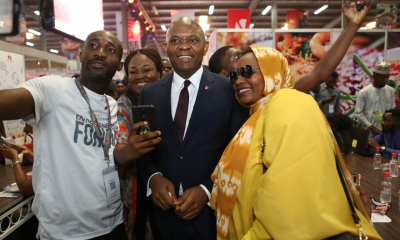Economy
African Development Bank and partners launch pilot Cities Diagnostics tool in five cities

The tool includes key environmental and urban sustainability indicators as well as disaster risk and vulnerability, and urban footprint growth.
ABIDJAN, Ivory Coast, October 7, 2019 – “The urban opportunities far outweigh the challenges,” said Prof. Davis G. Mwamfupe, the Mayor of Dodoma, Tanzania, during his message to the Cities Leadership workshop, launching the City Diagnostics for five pilot cities in Africa, held on the 25th and 26th September 2019 in Abidjan.
Five cities were chosen for the pilot phase of the Cities Diagnostics for 2019 -2020: Antananarivo (Madagascar), Bizerte (Tunisia), Conakry (Republic of Guinea), Dodoma (Tanzania) and Libreville (Gabon) and were represented by their respective authorities.
The African Development Bank, the Urban and Municipal Development Fund (UMDF) and the Korea Africa-Economic Cooperation (KOAFEC) organized the workshop to review the cities diagnostic methodologies with city managers and international urban development experts. Amadou Oumarou, Director of the Bank’s Infrastructure and Urban Development Department said, “The new City Diagnostics tool of the Bank will enable city managers and development partners to have a clear understanding of the situation in all the various sub-sectors of the city and allow us to prioritise our work”.
The diagnostic tool includes key environmental and urban sustainability indicators; two baseline studies covering disaster risk and vulnerability, and urban footprint growth. It also includes a public opinion survey covering accessibility and quality of municipal services for water, sanitation, electricity. Drainage, solid waste management, and other measures of quality of life in cities are also included. The tool can measure and assess inclusiveness and resilience parameters, strategies, municipal resource mobilization, investments, and public accounts administration.
The Mayor of Bizerte, Dr. Ben Amara Kamel stressed the challenge of limited municipal budget resources for capital infrastructure and services investments as well the difficulty of recruiting qualified municipal staff to cities, especially given Bizerte’s ambitious projects such as 100% clean energy by 2030. Participants from Conakry and Libreville also mentioned problems of city governance, the low level of municipal tax collection, poor sanitation, and solid waste management.
Also Read Prioritizing A Traditionally Underserved Somaliland Population Over Profit – Adan Abbey
The five pilot cities exchanged experiences at a panel headed by Ellis Juan, Senior Advisor to the Bank’s UMDF and former head of the Inter-American Development Bank emerging and sustainable cities program (ESC) . Juan highlighted some of the key lessons learned in Latin America which included the following:
- An integrated approach to city planning and management yields greater impact;
- Climate change should be integrated into city planning and management;
- Making cities for the people, or people-oriented cities;
- Order in the fiscal accounts, increased digitalization of city management and strong governance and transparency make for a credible partner;
- Efficient management of solid waste, sewerage and drainage systems, and water resources will preserve cities’ environmental assets for future generations while improving quality of life;
- Integrating mobility into urban planning and investing in quality public transportation services will drive productivity and create citizen-friendly cities;
The City Diagnostics program is fully funded by the UMDF, which supports African cities and municipalities to improve their resilience and manage urban growth and development better through planning, governance, and efficient public services as well as improving the quality of life in urban environments in Africa.
African Development Bank Group (AfDB)
Economy
Meta Hosts its First Youth Summit in Nigeria to Drive Innovation and Empowerment

Meta recently hosted its first Youth Summit in Lagos, Nigeria, bringing together over 200 young professionals, students, recent graduates, creatives, tech enthusiasts and aspiring entrepreneurs.
Themed ‘Empowering Youth Through Technology, Innovation and Entrepreneurship’, the summit included a series of thought-provoking panel discussions, a mentoring session and an interactive workshop designed to equip young Nigerians with the skills, insights and networks needed to thrive in today’s tech-driven world.
Commenting about the event, Phil Oduor, Head of Policy Programs, Sub-Saharan Africa said, “At Meta, we believe that today’s youth are tomorrow’s change-makers. Through initiatives like the Youth Summit, we aim to foster innovation, promote digital literacy and empower young Nigerians with the tools and opportunities to realise their potential and contribute to Nigeria’s growing digital economy.”
Delivering the keynote address, Femi Aluko, CEO/Co-Founder, Chowdeck, shared his journey of breaking barriers to achieve success in tech. He encouraged attendees to embrace the limitless opportunities within today’s technology ecosystem.
A panel discussion, led by Chinny Francis, Public Policy Manager at Meta, featured panellists Nifemi Akinwamide, Head of Operations, Alt School; Adaora Mbelu, Co-Founder of Lumination Global and Obaloluwa Adeagbo, Marketing Lead at Talstack. They shared valuable insights about the future of work, emphasising the importance of storytelling to build a personal brand, practicing self-awareness, developing soft skills, lifelong learning and honing problem-solving skills to thrive in a digitally transformed world.
Francis Sani, Technical Adviser for Innovation, Entrepreneurship & Capital at the Federal Ministry of Communications, Innovation & Digital Economy, spoke at the event. He highlighted the 3 Million Technical Talent (3MTT) program, emphasising that the program aims to build Nigeria’s technical talent backbone to drive the digital economy and position Nigeria as a net talent exporter. He encouraged youth to take advantage of this opportunity.
Another panel of industry experts took the stage during the ‘Lunch and Learn: Navigating Entrepreneurship in a Rapidly Changing Landscape’ session, moderated by Sade Dada, Head of Public Policy for Anglophone West Africa at Meta. Seye Bandele, CEO of PaidHR and Damilola Teidi-Ayoola, Head of Platform and Networks at Ventures Platform Fund, shared their invaluable insights. Seye highlighted the importance of grit, curiosity and candour, while Damilola reinforced the need to understand one’s target audience, deliver value through their business and embrace data-driven decision-making in the dynamic entrepreneurial landscape.
The event also featured inspiring conversations with leading figures in the creative industry. Miss Techy, an award winning tech content creator and Salem King, a creator, storyteller, author and speaker, shared their experiences and advice on achieving long-term success. Attendees also benefited from an interactive workshop and a mentoring session, where industry experts shared practical advice and strategies for entrepreneurs and tech enthusiasts.
Meta’s Youth Summit 2024 highlights a commitment to driving positive change, championing youth empowerment and advancing economic opportunities in Nigeria. Through investments in key areas—such as the creative industry, digital literacy, economic impact and youth job training—Meta is dedicated to empowering young Nigerians to thrive in today’s tech-driven world.
Cross-section of some of the attendees at the Meta Youth Summit 2024 in Lagos
L-R: Chinny Francis, Public Policy Manager, Meta; Nifemi Akinwamide, Head of Operations, Alt School; Adaora Mbelu, Co-Founder of Lumination Global and Obaloluwa Adeagbo, Marketing Lead at Talstack.
L-R: Sade Dada, Head of Public Policy, Anglophone West Africa, Meta; Damilola Teidi-Ayoola, Head of Platform and Networks, Ventures Platform Fund, and Seye Bandele, Chief Executive Officer, PaidHR during the Lunch and Learn: Navigating Entrepreneurship in a Rapidly Changing Landscape panel session.
Salem King, a creator, storyteller, author and speaker and Miss Techy, an award winning tech content creator
During a mentoring session workshop
Femi Aluko, Chief Executive Officer and Co-founder, Chowdeck.
Francis Sani, Technical Adviser to the minister of communications and digital economy of Nigeria
Economy
Tosin Eniolorunda: Fighting fraud related issues in financial ecosystem requires collaboration

Nigeria’s financial system has come under renewed scrutiny against the backdrop of the increase in the value of electronic payment transactions in Q1 2023 and the challenges posed by bad faith actors who exploit gaps in the payment systems even as Nigerian financial institutions have reported ₦159 billion ($201.5 million) lost to fraud since 2020. There is a need for all players in the financial services sector to come together in tackling these challenges.
Group CEO, Moniepoint Inc., Tosin Eniolorunda during a courtesy visit to the Chief Executive Officer, Fidelity Bank, Nneka Onyeali-Ikpe in Lagos. Onyeali-Ikpe, who welcomed the Moniepoint boss, used the opportunity to reaffirm her bank’s appreciation for the patience and understanding demonstrated during its banking channel integration optimization which resulted in service disruptions and the inability of Moniepoint customers to receive financial inflow.
It will be recalled that Fidelity Bank had recently announced to its customers and the general public, the resumption of interbank transfers to all licensed financial institutions in the country. This was following speculative reports from various media publications that the bank had imposed transaction restrictions on some neo banks operating in the country.
During conversations around the growth of the digital payments segment and contributions of the financial services to Nigeria’s socio-economic development, Tosin Eniolorunda used the occasion to stress the point that Moniepoint as a responsible and compliant organization takes customer KYC very seriously. “KYC is not merely an acronym but indeed a cornerstone in establishing trust, ensuring security, and complying with regulatory standards. All accounts created on our platform have BVN verification and in addition to this we perform a liveliness check at the point of onboarding. This is a comparison of the account holder’s life picture and the BVN image as a way to reduce impersonation,” Eniolorunda maintained.
He continued, “we have zero tolerance for fraud and typically go all out to ensure that we track fraudsters and fraudulent transactions on our platforms. We have deployed and utilize robust fraud detection systems and technologies that can analyze patterns, identify anomalies, and detect suspicious activities in the system. As such we are better empowered to identify potential fraud incidents and trigger alerts for further investigations and remedial actions.”
As partners in deepening the CBN’s mandate of ensuring provision of adequate and convenient financial services to consumers and guaranteeing their protection as well as the various undercurrents in the financial services industry, Moniepoint and Fidelity agreed to work closely together to develop a tightly knit mechanism to stem the menace of fraudulent transactions and collaboratively push through in addressing payment challenges in the country.
Economy
Angola becomes ATI’s 21st Member State, pays USD25m in capital subscription fees

The Republic of Angola has become the 21st African Member State and the 1st Lusophone Member State of pan-African insurer, Africa Trade Insurance Agency – ATI, after paying a capital subscription of USD25 million. The membership was funded the Angolan National Treasury resources and proceeds from the landmark BITA water project – a strategic public investment for the construction of infrastructure for the treatment, supply and storage of drinking water that will benefit 2.5 million people in Angola.
Welcoming Angola’s membership, ATI’s Chief Executive Officer, Manuel Moses, noted the country’s demonstration of its commitment to diversify its economy through ATI’s trade and investment risk mitigation solutions.
“We are happy to support Angola in its quest to economic diversification and becoming an agricultural powerhouse on the African continent. Angola’s membership is timely as ATI’s risk mitigation and credit enhancement services will act as a catalyst for strengthening and diversifying Angola’s economy, supporting both increased investment, exports and trade under Africa’s continental framework of the AfCFTA,” Mr. Manuel said.
Under this one of a kind blended finance and guarantee innovative structure, the Republic of Angola – along with the lenders covered by ATI under the transaction – agreed for the use of proceeds under the syndicated loan to also include the financing for the purpose of Angola becoming a member of ATI. ATI provided guarantee and insurance support for this World Bank’s partially guaranteed facility to the Government of Angola for the expansion and improvement of water supply service in the urban and peri-urban belts of Luanda.
Current exposure
ATI’s gross exposure in Angola, the largest country in Southern Africa Region, currently stands at USD467M mainly in construction, energy & gas, trade & transport, water supply and wholesale & retail sectors, with transactions valued at USD1.4B.
“This development was made possible because of ATI’s pan African mandate that allows the organization to cover transactions in Angola and beyond, despite ATI non-membership. Now that Angola is a fully-fledged shareholder of ATI, the country can fully access more of ATI’s guarantee solutions to attract more Foreign Direct Investments and boost its internal and external trade across the region,” Mr. Manual explained.
Angola’s economy is mainly driven by its oil sector but the country seeks to pursue new growth models for economic diversification through the agricultural sector and private sector development.
With ATI’s support, Angola is on the path to fiscal consolidation, manage their debt ceiling, increase in public and private investment, in order to resume the ascending curve of sustainable and inclusive economic growth as well as human development.
ATI has grown from a small African start-up in 2001 into a pan-African institution with presence across Africa and with a significant global reach. Besides Angola, other member countries include Benin, Burundi, Cameroon, Côte d’Ivoire, Democratic Republic of Congo, Ethiopia, Ghana, Kenya, Madagascar, Malawi, Niger, Nigeria, Rwanda, Senegal, South Sudan, Tanzania, Togo, Uganda, Zambia, and Zimbabwe.
Institutional members include African Development Bank, African Reinsurance Corporation, Atradius Group, Chubb, CESCE (Spanish ECA), Ministry of Finance India (represented by ECGC), SACE SIMEST, The Common Market of Eastern and Southern Africa (COMESA), Trade and Development Bank (TDB), Kenya-Re, The PTA Reinsurance Company (Zep-Re), and the UK Export Finance.
-

 Afripreneur3 days ago
Afripreneur3 days agoMeet Datari Ladejo, the digital strategist helping brands thrive in the digital economy
-

 Afripreneur10 hours ago
Afripreneur10 hours agoCreativity, Data, and Innovation: Tutu Adetunmbi’s Vision for Africa’s Marketing Future with Stamfordham
-

 Press Release1 day ago
Press Release1 day agoThe 234 Venture Vault Launches Tech Startups and Talents Hunt Across Nigerian Tertiary Institutions
-

 Afripreneur9 hours ago
Afripreneur9 hours agoMeet Nzinga B. Mboup, a Senegalese architect committed to climate-friendly construction for African cities

















